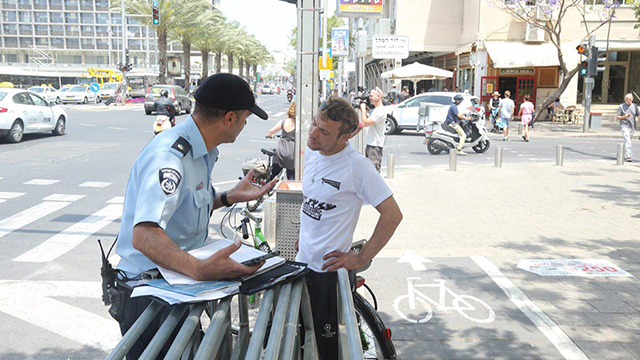The responsible Knesset committee has authorized a government bill to widen municipal enforcement of all sidewalk-related offenses, affecting cyclists, scooter-riders, and pedestrians.
The Knesset’s Economic Affairs Committee approved the second and third readings on Sunday of a government bill to streamline municipal inspection and enforcement, which is intended to empower municipal inspectors to handle violations both by cyclists and scooter-riders who flout laws pertaining to them and by pedestrians who walk in the bicycles-only lanes.
The fines are to be set in local authorities’ bylaws, and each one will be permitted to determine their amount. The fines for pedestrians walking in bicycle lanes are expected to be 100 shekels, on average. They will take effect three months after the bill becomes law.
The committee’s chairman, MK Eitan Cabel (Zionist Union), said that the law needs to take effect and that every day of delay is superfluous: “The day is not far when order will return to the sidewalks, and it will be clear to everyone where their place is—and whoever does not observe the law will be punished.” The government bill was merged with the private bill introduced by MK Merav Ben Ari (Kulanu) and others.

The bill would grant enforcement authorities to local authorities for the offenses of sidewalk disturbances, using one’s telephone whilst cycling, and cycling with earphones. The inspectors would receive the authority to order an area be cleared, to remove the air from bicycle tires, towing authority, and the power to detain and hand out fines.
The law will come into effect a half year after its publication in the Official Gazette to allow the Israel Police to determine enforcement procedure to be authorized by the attorney general, and then the local authorities will individually approve it.
The minister of public security will be entitled to delay the law’s coming into effect by up to three months if the above process has not completed with an order from the Economic Affairs Committee. The bill does not require the local authorities to carry out enforcement, only authorizes them so to do.
The bill also authorized that the fines for towing and storage would reflect the cost of those actions, and Cabel insisted that local authorities report to his committee on fines and payments. It was decided that the minister of the interior and the Federation of Local Authorities in Israel will report every two years to the Economic Affairs Committee on the fees and payments charged for towing and storage. The first report to the committee will be given one year after the law comes into force.
The local authorities intend to sell the seized bicycles and scooters that are not reclaimed to cover the costs 60 days after seizure.
During the meeting, a fiery disagreement broke out when the proposal to permit inspectors to fine pedestrians walking in bicycle lanes who refuse to vacate them. Cabel asked the local authorities to undertake a publicity campaign on the subject in the near future so that pedestrians would be aware of the enforcement.
Ben Ari stated that she herself cycles and alerts pedestrians who are blocking bicycle lanes, but giving out fines is too drastic, as is granting the authority for that to inspectors.
The general manager of Forum 15 (the Israeli Forum of Self-Government Cities), Eitan Atia, said that if this was considered too drastic, the authority could be returned to the police to enforce. Tel Aviv-Jaffa Municipality Deputy Mayor Meital Lehavi said, “The law regulates enforcement from the wall to the curb for all users, provided that they have an alternative, and therefore it’s correct to have enforcement also for pedestrians.”
The Israel National Road Safety representative, Meirav Rafaeli, and the pedestrians’ representative, Hagit Orian, presented similar views. The committee then authorized Cabel’s proposal, according to which enforcement against pedestrians will take place three months after the law takes effect.
As reported by Ynetnews
